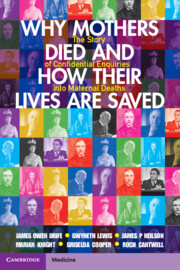 Why Mothers Died and How their Lives are Saved
Why Mothers Died and How their Lives are Saved Published online by Cambridge University Press: 05 April 2023
During World War II maternal mortality fell. In the USA deaths were investigated by local committees and in 1949 the RCOG decided Britain should do the same. Its president, Eardley Holland, had worked with George Godber of the Ministry of Health during the war and they set up an Enquiry covering England and Wales. After each death a local obstetrician sent information to a regional assessor, who could request further comments. Assessors' reports, which included no names, were collated by two national obstetric assessors. A team of five authors, including an anaesthetist, compiled a triennial report which anyone could buy. In each case a 'primary avoidable factor' was identified. Deaths were grouped by cause. The Ministry was anxious about the Report’s frankness but its publication in 1957 met with wide approval and no complaints about anonymity. The recommendations were disseminated in medical journals. Government committees recommended wideer availability of hospital birth. The Reports became UK-wide in 1985. New chapters discussed psychiatric illness, social exclusion and ethnicity, showing the need for Enquiries to continue despite the low overall mortality rate.
To save this book to your Kindle, first ensure no-reply@cambridge.org is added to your Approved Personal Document E-mail List under your Personal Document Settings on the Manage Your Content and Devices page of your Amazon account. Then enter the ‘name’ part of your Kindle email address below. Find out more about saving to your Kindle.
Note you can select to save to either the @free.kindle.com or @kindle.com variations. ‘@free.kindle.com’ emails are free but can only be saved to your device when it is connected to wi-fi. ‘@kindle.com’ emails can be delivered even when you are not connected to wi-fi, but note that service fees apply.
Find out more about the Kindle Personal Document Service.
To save content items to your account, please confirm that you agree to abide by our usage policies. If this is the first time you use this feature, you will be asked to authorise Cambridge Core to connect with your account. Find out more about saving content to Dropbox.
To save content items to your account, please confirm that you agree to abide by our usage policies. If this is the first time you use this feature, you will be asked to authorise Cambridge Core to connect with your account. Find out more about saving content to Google Drive.